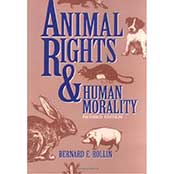Part One: Moral theory and animals —
Introduction —
Moral intuitions and moral theory —
Having a soul —
Relevant differences —
Man’s dominion —
Duties toward animals as duties towards men —
Reason, language, and moral concern —
Social contract theories —
Kant’s theory of reason —
Kant’s ethic —
Man as “end in himself” —
Animals as means —
language and reason —
The ordinary notion of rationality —
Do animals behave rationally? —
Are only humans “language-rational”? —
Do animals use concepts? —
Animals and human language —
Moral concern and non-rational humans —
Our concern for non-rational human interests —
The moral relevance of pleasure and pain —
Interest in survival and freedom —
Moral concern and creatures with interests —
Interests, language, and natural signs —
Life and awareness as the source of interests: The Telos of living things —
Interests and awareness —
Moral theory and our world view —
Do animals have “moral rights”? —
The right to moral concern —
The right of life —
The violation of rights —
Animals as ends in themselves —
Specific rights and animal nature —
Telos and ethology —
Where do you draw the line? —
How do we deal with competing interests? —
Must we police creation? —
Don’t animals kill each other? —
The non-living environment —
Don’t we have enough problems with human morality? —
Isn’t all this utopian? Part Two: Animal rights and legal rights —
How are law and morality connected? —
Natural law theory —
Natural rights —
The rejection of natural law and natural rights: legal positivism —
The revival of natural rights —
Rights are a protection for the individual against the general welfare —
How rights are established —
How does this relate to animals? —
Don’t animals have legal rights now? —
Do animals need rights? Their legal status today —
Legalizing the rights of animals —
What can we expect to achieve? —
Is our position absurd? Part Three: The use and abuse of animals in research —
Introduction —
The six senses of research —
Moral principles for research: The utilitarian and rights principles —
Introduction to the testing of consumables —
The LD50 test —
The Draize test —
Carcinogen, mutagen, and teratogen testing —
The concept of alternatives to animal experimentation —
The use of animals in teaching —
Research cruelty and the training of scientists —
The debasement of language in science —
Creating a revolution in science education —
some personal notes —
Introduction to the use of animals in basic research —
Freedom of thought vs. the moral status of animals —
The use of “alternatives” in basic research —
Theory-based science vs. empirical dabbling —
Behavioral psychology: A paradigm case of bad science and unnecessary cruelty —
Improving the lot of research animals —
Feasible legislation —
Meaningful peer review and monitoring of research —
The role of humanists in science —
Introduction to the use of animals in applied medical research —
The focus of medical research and practice —
some philosophical reflections —
Introduction to the use of animals in drug research —
Introduction to the use of animals for product extraction —
Conclusion. Part Four: Morality and pet animals —
Morality, empathy, and individuality —
The triggering of empathy —
Pet animals and the social contract —
Human breach of contract —
Violating the right to life —
The human tragedy —
Violation of Telos —
Social institutions as a mirror of individual irresponsibility —
Viable legislation and the pet problem —
The need for an educational Blitzkrieg —
The role of human organizations —
The role of veterinarians
